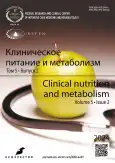The effectiveness of specialized high-viscosity nutritional formulas in restoring swallowing function in patients with dysphagia at the acute phase of ischemic stroke
- Authors: Ershov V.I.1
-
Affiliations:
- Orenburg State Medical University
- Issue: Vol 5, No 2 (2024)
- Pages: 71-76
- Section: Original Study Articles
- URL: https://journals.rcsi.science/2658-4433/article/view/292205
- DOI: https://doi.org/10.17816/clinutr641834
- ID: 292205
Cite item
Full Text
Abstract
Background: Neurogenic dysphagia is a common swallowing impairment, particularly prevalent among patients who have suffered an ischemic stroke. This condition significantly increases the risk of aspiration pneumonia and heightens risks associated with protein-energy malnutrition and dehydration. Swallowing retraining through targeted therapeutic interventions is one of the primary approaches in managing patients with neurogenic dysphagia.
AIM: To evaluate the effectiveness of specialized nutritional formulas of varying viscosity in restoring swallowing function in patients with dysphagia at the acute phase of ischemic stroke as part of combined therapy.
Methods: The study enrolled 65 patients with acute cerebrovascular accident complicated by dysphagia. Patients were randomly assigned into two groups: experimental and control. The experimental group received specialized nutritional formulas of varying viscosity by Fresenius Kabi, whereas the control group received traditional nutrition. The severity of swallowing disorders and their progression were evaluated using the Penetration–Aspiration Scale (PAS) and the Fiberoptic Endoscopic Dysphagia Severity Scale (FEDSS).
Results: Implementation of swallowing retraining in patients with ischemic stroke and dysphagia starting from Day 5 demonstrated superior recovery of swallowing function according to the PAS compared to the control group, with statistically significant differences by Day 10 (p=0.002). A similar trend was observed when evaluating swallowing using the FEDSS. On Day 10, the experimental group after ischemic stroke exhibited significantly improved dysphagia scores compared to the control group (p=0.002). Data from all 65 patients with acute ischemic stroke complicated by dysphagia indicated that specialized nutritional formulas accelerate the restoration of swallowing function compared with traditional nutrition. Marked improvement was noted as early as on Day 5 of treatment among patients receiving Fresenius Kabi high-viscosity formulas. No cases of aspiration pneumonia or progression of protein-energy malnutrition were recorded during the study.
Conclusion: Specialized nutritional formulas of varying viscosity as part of combined therapy significantly accelerate the recovery of swallowing function in patients with acute ischemic stroke, proving to be more effective than traditional nutritional approaches.
Full Text
##article.viewOnOriginalSite##About the authors
Vadim I. Ershov
Orenburg State Medical University
Author for correspondence.
Email: ervad2010@yandex.ru
ORCID iD: 0000-0001-9150-0382
SPIN-code: 2400-1759
MD, Dr. Sci. (Medicine), Professor
Russian Federation, 3 Orujeva st, vil. 9 January, 460532, OrenburgReferences
- Belkin AA, Ershov VI, Ivanova GE. Violation of swallowing in emergency conditions — postextubation dysphagia. Anesthesiology and intensive care. 2018;4:76–82. EDN: YTNPVZ doi: 10.17116/anaesthesiology201804176
- Ershov VI, Belkin AA, Karpets AV, et al. The effectiveness of the training method of rehabilitation using special nutritional mixtures in patients with ischemic stroke and neurogenic dysphagia as part of combination therapy. Neurology, neuropsychiatry, psychosomatics. 2019;2:65–70. doi: 10.14412/2074-2711-2019-2-65-70
- Ershov VI, Zdvizhkova SV, Gonchar-Zaikin AP, et al. The treatment efficacy of disturbed swallowing function in patients with ischemic stroke and neurogenous dysfagia in the intensive care unit. S.S. Korsakov Journal of Neurology and Psychiatry. 2019;119(7):35–40. doi: 10.17116/jnevro201911907135
- Ershov VI, Borzdyko AA, Silkin VV. The treatment efficacy of disturbed swallowing function in patients with ischemic stroke and neurogenic dysphagia. Russian Neurological Journal. 2021;26(3):51–57. EDN: UNFDNR doi: 10.30629/2658-7947-2021-26-3-51-57
- Borzdyko AA, Ershov VI, Umalatova NV, et al. Prediction of the restoration of swallowing function in patients with ischemic stroke and neurogenic dysphagia. Neurology, neuropsychiatry, psychosomatics. 2023;3:54–59. doi: 10.14412/2074-2711-2023-3-54-59
- Kobrina LM, Loseva SM, Litvinenko IV. Rehabilitation work to overcome speech and intellectual disabilities in patients with traumatic brain injury: St. Petersburg: A.S. Pushkin Leningrad State University; 2024.
- Borzdyko AA. Neurogenic dysphagia in the acute period of ischemic stroke. Information Archive. 2021;15(2):29–33.
- Zaitsevskaya SA, Lukmanov RH, Berdnikovich ES, Suponeva NA. Dysphagia in neurological disorders. Annals of Clinical and Experimental Medicine. 2024;18(2):52–61. EDN: HBRDFE doi: 10.17816/ACEN.974
- Borzdyko AA. Dysphagia in the acute period of ischemic stroke. Almanakh molodoi nauki. 2022;2(45):4–5. (In Russ.) EDN: JRKLOO
- Ivanova NE, Efimova MU, Gavrik MM. Pathogenetic aspects of post-stroke dysphagia (literature review). Russian Neurosurgical Journal. 2020;12(2):53–57. EDN: YBKFAJ
- Khatkova SE, Pogoreltseva OA. Algorithms for the diagnosis and treatment of cognitive impairment and dysphagia in patients after stroke. S.S. Korsakov Journal of Neurology and Psychiatry. 2024;124(4–2):100–107. EDN: FQFKND doi: 10.17116/jnevro2024124042100
- Gavrik MM, Ivanova NE, Makarov AO, Efimova MU. Dysphagia in elderly patients who have suffered repeated cerebrovascular accident. The Russian Neurosurgical Journal named after Professor A.L. Polenov. 2021;13(S1):36–37. EDN: IJPEJX doi: 10.1016/j.otc.2018.03.006
- Tynterova AM, Perepelitsa SA, Skalin YuE, et al. Diagnostics of psychoemotional and cognitive disorders in the acute period of ischemic stroke. Physical and rehabilitation medicine, medical rehabilitation. 2021;3(3):270–280. EDN: PVULNQ doi: 10.36425/rehab77964
- Park JS, Oh DH, Hwang NK, Lee JHJ. Effects of neuromuscular electrical stimulation combined with effortful swallowing on post-stroke oropharyngeal dysphagia: a randomised controlled trial. J Oral Rehabil. 2016;43(6):426–434. doi: 10.1111/joor.12390
- Huh JW, Park E, Min YS, et al. Optimal placement of electrodes for treatment of post-stroke dysphagia by neuromuscular electrical stimulation combined with effortful swallowing. Singapore Med J. 2020;61(9):487–491. doi: 10.11622/smedj.2019135
- Ershov VI, Novikova TV. Three main components of initial enteral support for neurological patients in critical illness. Russian Journal of Anesthesiology and Reanimatology. 2023;(6):84–90. EDN: FEUHSJ doi: 10.17116/anaesthesiology202306184
- Pasechnik IN, Sirota AE, Novikova TV. Postextubation dysphagia, or icu-acquired swallowing dysfunction. Russian Journal of Anesthesiology and Reanimatology. 2022;(6):115–121. EDN: QPSDHQ doi: 10.17116/anaesthesiology2022061115
- Singer P, Blaser AR, Berger MM, et al. ESPEN guideline on clinical nutrition in the intensive care unit. Clinical Nutrition. 2019;38(1):48–79. doi: 10.1016/j.clnu.2018.08.037
- van Zanten ARH, De Waele E, Wischmeyer PE. Nutrition therapy and critical illness: practical guidance for the ICU, post-ICU, and long-term convalescence phases. Critical Care. 2019;23(1):368. doi: 10.1186/s13054-019-2657-5
- Zusman O, Theilla M, Cohen J, et al. Resting energy expenditure, calorie and protein consumption in critically ill patients: A retrospective cohort study. Critical Care. 2016;2016:20367. doi: 10.1186/s13054-016-1538-4
Supplementary files










